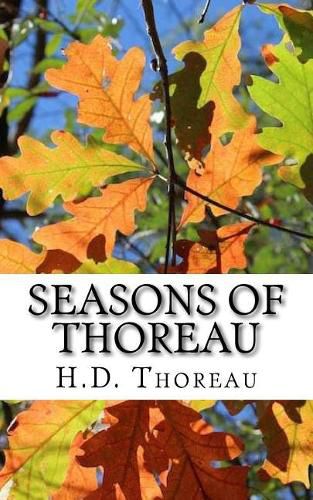Readings Newsletter
Become a Readings Member to make your shopping experience even easier.
Sign in or sign up for free!
You’re not far away from qualifying for FREE standard shipping within Australia
You’ve qualified for FREE standard shipping within Australia
The cart is loading…






Henry David Thoreau was fascinated by the endless cycle of the seasons, by the endless pursuit of self-improvement, and by parallels between the two. For Thoreau, the phenomena of the seasons were symbolical of human life: just as plants go through stages such as bud, leaf, flower, and fruit, or seed, seedling, and tree; just as agriculture persuades nature to yield its bounty through planting, cultivating, and harvesting, and delivers that bounty by storing it and bringing it to market; just as all things grow in spring, flourish in summer, ripen in autumn, and go dormant in winter; so, following ancient traditions and his own insights, Thoreau perceived deep patterns in human life and saw virtues like deliberation, discipline, gratitude, reverence, self-trust, magnanimity, independence, and simplicity as suggestive of certain stages of human life, periods of the year, and even times of the day. The passages collected here illuminate these connections. Some of them are about nature, some are about ethics, and some bridge the gap between the two. By returning again and again to the same themes in Walden, in his essays, and in his Journal, Thoreau built up a system of images that clearly demonstrates his integrated understanding of, and wholehearted devotion to, cultivating a better life.
$9.00 standard shipping within Australia
FREE standard shipping within Australia for orders over $100.00
Express & International shipping calculated at checkout
Henry David Thoreau was fascinated by the endless cycle of the seasons, by the endless pursuit of self-improvement, and by parallels between the two. For Thoreau, the phenomena of the seasons were symbolical of human life: just as plants go through stages such as bud, leaf, flower, and fruit, or seed, seedling, and tree; just as agriculture persuades nature to yield its bounty through planting, cultivating, and harvesting, and delivers that bounty by storing it and bringing it to market; just as all things grow in spring, flourish in summer, ripen in autumn, and go dormant in winter; so, following ancient traditions and his own insights, Thoreau perceived deep patterns in human life and saw virtues like deliberation, discipline, gratitude, reverence, self-trust, magnanimity, independence, and simplicity as suggestive of certain stages of human life, periods of the year, and even times of the day. The passages collected here illuminate these connections. Some of them are about nature, some are about ethics, and some bridge the gap between the two. By returning again and again to the same themes in Walden, in his essays, and in his Journal, Thoreau built up a system of images that clearly demonstrates his integrated understanding of, and wholehearted devotion to, cultivating a better life.